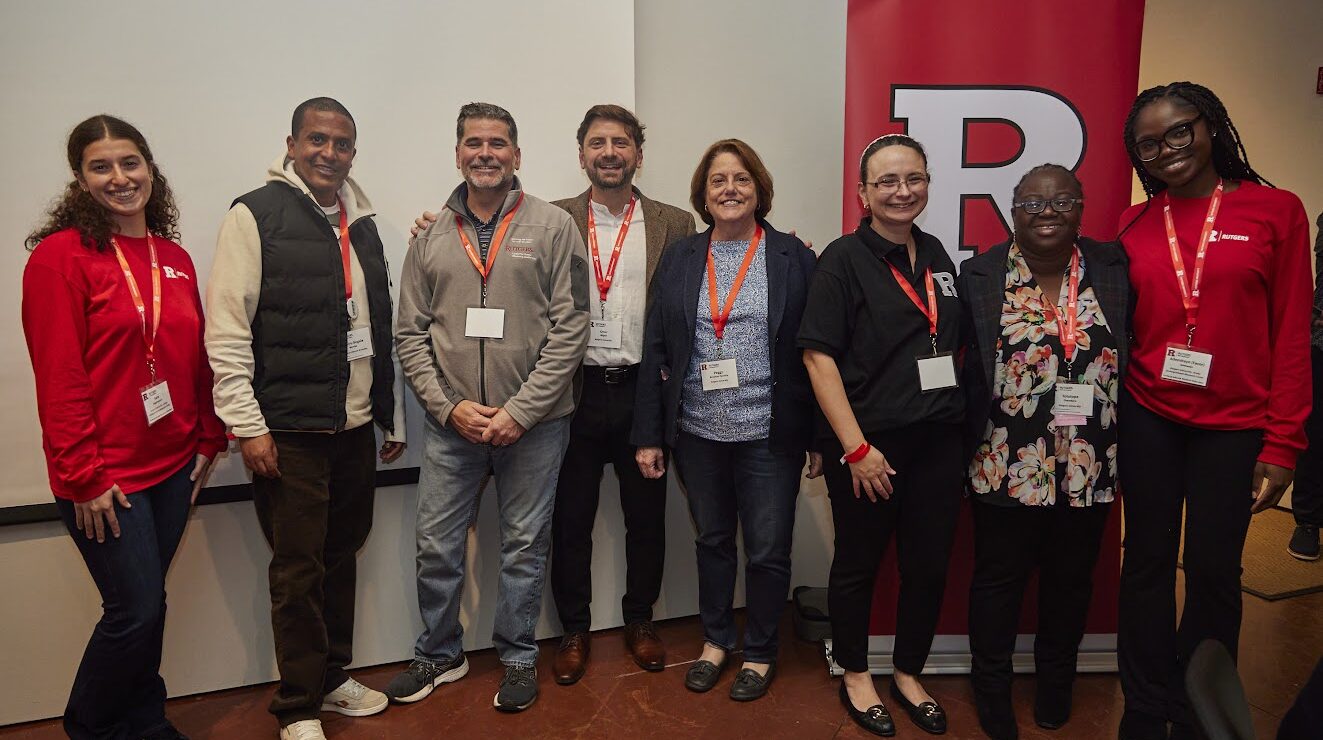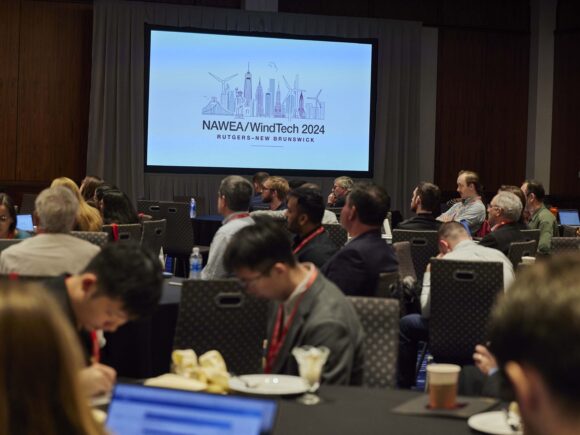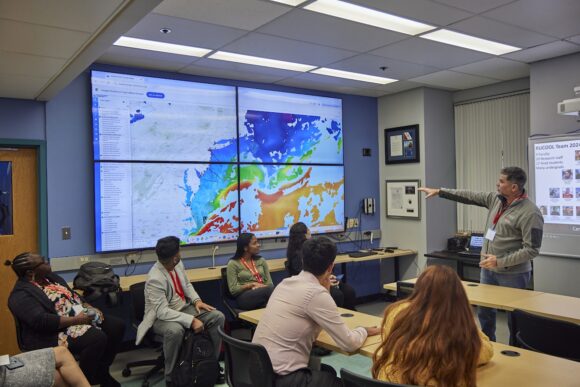
Several of the key organizers of the Graduate Student Symposium and Industry-Student Networking Event, which formed part of the weeklong North American Wind Energy Academy (NAWEA)/WindTech 2024 conference held at Rutgers. L-R: Sara Asgarzadeh, Rutgers undergraduate student volunteer; Nebiyu Bogale Mereke, Universite Libre de Bruxelles; Josh Kohut, Professor, Marine and Coastal Sciences, Rutgers SEBS ; Onur Bilgen, Associate Professor, Mechanical and Aerospace Engineering, Rutgers SOE; Peggy Brennan-Tonetta, Senior Associate Director, Rutgers NJAES; Amy Mandelbaum, Senior Program Administrator, Rutgers NJAES; Tolu Omodara, graduate student, Rutgers-Camden; and Ademitayo (Favor) Adebanjo, Rutgers undergraduate student volunteer.
More than 125 undergraduate and graduate students attended a wind energy workforce engagement symposium and networking event on October 29. Dubbed the Graduate Student Symposium (GSS), open to undergraduate students, and Industry-Student Networking Event, this two-part activity was a critical part of the weeklong North American Wind Energy Academy (NAWEA)/WindTech 2024 conference that drew representatives from 18 countries. This premier technical conference on wind energy in North America, which featured leading research on topics ranging from climate change to turbine design, was hosted by Rutgers University and the New Jersey Academic Alliance for Offshore Wind Energy.
At the daylong symposium, the students honed their science communication skills and furthered their knowledge of careers in the fields of wind energy technology, research, and innovation while networking with others from across the globe.

Attendees at NAWEA/WindTech 2024 wind energy conference at Rutgers.
Onur Bilgen, professor of mechanical and aerospace engineering who served as the general chair of the conference, said state and university support for the field has helped drive its advance.
“The success of NAWEA/WindTech 2024 places New Jersey at the center of the global wind energy field, opening pathways to new partners, research and educational grants, investment and other benefits for workforce development,” Bilgen said. “And Rutgers and the members of the New Jersey Academic Alliance for Offshore Wind Energy are preparing the next generation of leaders in wind and renewable energy.”
Bilgen cited contributions from the Rutgers Offshore Wind Energy Collaborative, co-led by Margaret Brennan-Tonetta, a senior associate director of the Rutgers New Jersey Agricultural Experiment Station/Economic Development. The collaborative includes Rutgers faculty and staff from all three Rutgers campuses and over 15 disciplines at the university.
“Collaboration and knowledge-sharing are critical to foster growth of a wind-based economy in New Jersey,” Brennan-Tonetta said.
She credited the New Jersey Economic Development Authority for providing funding through a NJEDA University Initiatives grant awarded to Rutgers that escalated the growth of the Collaborative and enabled the development of numerous programs, including curriculum development, community outreach and annual symposia.
“With all the advances occurring in science and technology and the enthusiasm of so many in this field — as we have witnessed at this conference — the future for wind energy is bright,” Brennan-Tonetta said. “Researchers and students should be poised for the many opportunities that this new industry will generate.”

Professor Josh Kohut engage with students who toured the Rutgers Center for Ocean Observing Leadership (RU-COOL) facility to learn more about the center’s offshore wind energy work as part of the Graduate Student Symposium and Industry-Student Networking Event on October 29.
The planning committee of the Graduate Student Symposium, partially funded by a grant from the National Science Foundation, worked over the past year to develop and implement a packed agenda for the activity focused on the theme, “Wind Energy Workforce Engagement and Training.”
The symposium agenda included:
- Welcome address from Dr. Ahmed Aziz Ezzat, Assistant Professor of Industrial and Systems Engineering at Rutgers University.
- Keynote address on “Climate Change Communication” by Dr. Lauren Feldman, Professor of Journalism and Media Studies at Rutgers.
- Interactive science communication training program by Stony Brook University’s Alan Alda Center for Communicating Science.
- Student presentations on their wind energy research through five-minute “Flash Talks” focused on wind energy technologies, environmental science, and social science and policy.
- “A Day in the Life” panel discussion session, which provided insights into the daily responsibilities, opportunities, and challenges faced by professionals in various sectors of wind energy – academia, national laboratory, manufacturing, and government.
- Student hands-on activities, which included build-your-own wind turbine and the Rutgers Ocean Expedition board game, while other students took a tour of the Rutgers Center for Ocean Observing Leadership (RU-COOL) facility to learn more about the center’s offshore wind energy work.
The symposium was followed by an Industry-Student Networking Event, which included a guided tour of the Zimmerli Art Museum gallery followed by networking and a Rutgers Historical Ghost Tour led by Matthew Ferguson, a Rutgers alumnus and history buff.
Parts of this article were extracted from the original Rutgers Today story on the conference.

